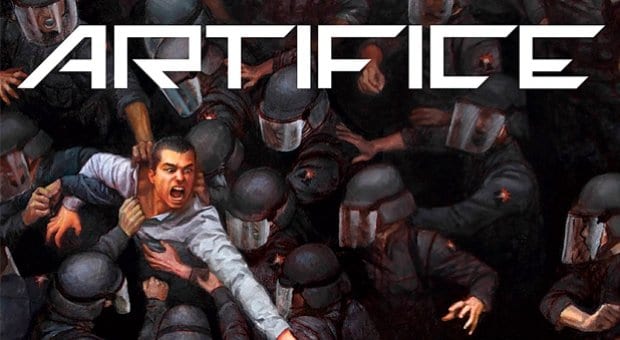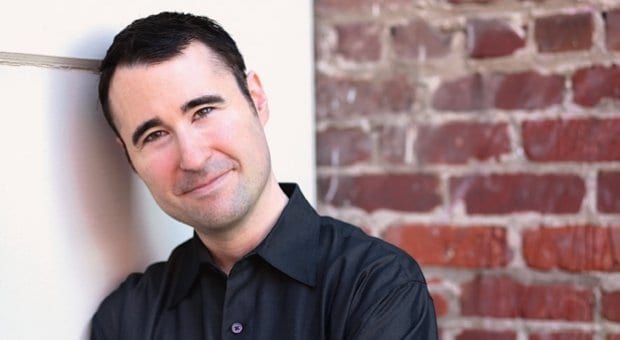
Artifice Credit: Courtesy of Alex Woolfson
As the internet increasingly democratizes publishing, some queer comic creators are producing quality, independent graphic novels and connecting with a worldwide audience starving for gay action heroes.
Alex Woolfson’s Artifice began as a web comic and, with the help of a crowdsourcing campaign, is now available in print.
When Woolfson started writing Artifice, he had about 300 readers a day; within a year the number of readers had multiplied to 7,000.
His current web comic, The Young Protectors, pulls about 12,000 readers on the days he publishes a new page in the series.
Set in a future where corporations have their own militaries, Artifice revolves around the interrogation of Deacon, an android who turns on his rescuers to protect the sole survivor of a team of scientists he was sent to kill.
Woolfson says he was inspired by the opening scene of the movie Aliens, as well as groups like ACT UP and Queer Nation in the 1980s that demanded their rights rather than requesting them politely.
“In the opening scene of Aliens, the android, Bishop, is outed after somebody calls him a synthetic, and he says, ‘I prefer artificial person myself,’” Woolfson says from his home in San Francisco.
“You could see that James Cameron was referencing what was happening at the time: that minorities wanted to name themselves as opposed to taking on the name society had foisted on their shoulders.”
Deacon’s story is somewhat analogous to that of Chelsea (formerly Bradley) Manning, the queer servicewoman now facing life in prison for passing classified material to WikiLeaks. From custody to interrogation, Deacon is treated like someone who lacks feelings and compassion, when in reality he is the only person in the corporation who behaves like a human.
“Corporations don’t think of themselves as evil; they just think of themselves as providing a wonderful service to everybody,” Woolfson says. “They have absolutely no moral responsibility to anybody but their shareholders. That’s something of an issue right now in the United States, and I think it’s going to become a greater issue worldwide as corporations continue to gain more power.”
Echoes of the X-Men storyline God Loves, Man Kills also surface in psychologist Clarice Maven’s investigation to determine whether it’s a short circuit that caused Deacon to rebel against the corporation or if he’s experienced an emotion, like falling in love with the boy he saved. Unlike the typical meditations on consciousness, Deacon must prove he is a machine if he is to survive.
“As a teenager in the ’80s, the X-Men was perhaps the truest representation of what it was like to be gay that I had access to,” Woolfson says. “It was a very clear parable of how the religious right treated gays in America.”
Woolfson didn’t approach traditional comic publishing houses with Artifice because he wanted the creative control and freedom to tell exactly the kind of story he wanted to see. He applauds the number of gay characters in mainstream comics, but the advantage of producing his own comics is that the gay, kickass genre hero is front and centre instead of off to the side.
“They’re the heroes of the story, as opposed to being part of the larger team or the comedic sidekick or on an alternative Earth, far, far away from the regular continuum of comics, which can be how gays are treated,” he says.
“And I don’t shy away from romance. It’s not adult per se, but it does focus on both the love and erotic elements of the story, which is something you’re not going to get from the mainstream.”
Woolfson spends about 40 to 60 hours a week writing the scripts, determining the number of panels on each page and working with illustrators to make sure the comic is easy to read and follow. He also letters the comics.
Crowdsourcing has given him the ability to produce professional-looking work and distribute it. It also gives him the opportunity to test what resonates with readers. He was confident there would be an audience for the print version of Artifice when he asked for $7,000 and received more than $36,000.
The crowdsourcing campaign for the print edition of The Young Protectors received more than $100,000. While that number might sound impressive, Woolfson points out that by the time the comic is produced and distributed and he’s honoured his commitments to his contributors, with extras like trading cards and posters, there’s not a lot left over.
Still, it’s worth it to Woolfson, who prefers to hold a tangible graphic novel than read one online. And while he isn’t making his living creating comics yet, it certainly feels more possible than it has in the past.
Artifice, Alex Woolfson, Illustrated by Winona Nelson, $15.60. webcomics.yaoi911.com

 Why you can trust Xtra
Why you can trust Xtra


